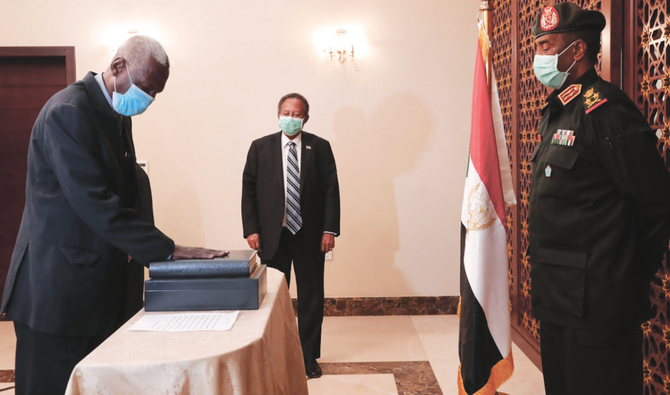CAIRO: Sudan on Tuesday swore in a new defense minister more that two months after the death of the former defense chief and amid tensions with neighboring Ethiopia.
Maj. Gen. Yassin Ibrahim Yassin was sworn in before Gen. Abdel-Fattah Burhan, head of the ruling sovereign council, according to a statement from the council. Yassin came out of retirement to take the position.
The ceremony was held in the capital Khartoum.
Prime Minister Abdalla Hamdok and the country’s Chief Judge Neamat Abdullah attended the ceremony, the statement said.
Yassin replaced Gen. Gamal Al-Din Omar, who died in March of a heart attack in neighboring South Sudan, while taking part in peace talks between his country’s transitional government and rebel groups.
Yassin told reporters after the ceremony he would support Hamdok’s government and work hard to “achieve the goals ... of the transitional period.”
Born in 1958 in Khartoum, Yassin, a career army officer, studied at Sudan’s military academy, and obtained a bachelor’s degree in military science from Jordan’s Mutah University. He retired in 2010, according Sudan’s official SUNA news agency.
The swearing-in came amid tensions with neighboring Ethiopia over a cross-border attack allegedly conducted by a militia backed by Ethiopia’s military.
At least one Sudanese army officer and one child were killed in an attack on Thursday by an Ethiopian militia group in Sudan’s eastern Al-Qadarif province, according to Sudan’s military. Another Sudanese officer and three civilians were wounded in the incident, according to the Sudanese statement.
Sudan is on a fragile path to democracy after a popular uprising led the military to overthrow former President Omar Bashir in April last year. A military-civilian government now leads the country to elections in less than three years.
The transitional administration faces towering challenges, including the dire economic conditions that fueled the protests late in 2018 that eventually led the military to remove Bashir. Sudan’s economy has been battered by decades-long civil wars and international sanctions.
Achieving peace with armed groups is crucial for the government as it would allow a reduction in military spending, which takes up to 80 percent of the budget, the prime minister has said.
Sudan has been convulsed by rebellions in its far-flung provinces for decades, and while a rebel alliance has joined the pro-democracy coalition, it said last month that it should be represented in the transitional government.
The August power-sharing deal has called for the government to reach a peace agreement with the rebels within 6 months. This deadline was not met and both sides agreed to extend the talks to reach a deal.




























